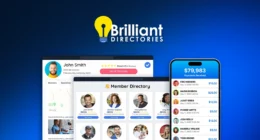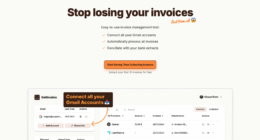Construction software helps small businesses boost productivity and profitability through essential features like project planning, document management, and cost tracking. Popular solutions include Procore, BuilderTrend, and RedTeam Go, with pricing options suited for smaller operations. Cloud-based platforms offer mobile accessibility, real-time updates, and automated tools that reduce errors and streamline workflows. Implementation requires proper planning and training, but the right software can reduce rework by up to 52%. Exploring specific platforms reveals which features best match individual business needs.
Quick Overview
- Cloud-based construction software reduces hardware costs while providing real-time updates and automated task management for small businesses.
- Popular platforms like BuilderTrend and RedTeam Go offer specialized features tailored to small construction companies' needs and budgets.
- Mobile accessibility enables on-site project management, document access, and improved communication between office staff and field teams.
- Automated quantity takeoffs and cost management features help small businesses create more accurate bids and maintain better profit margins.
- Implementation requires structured planning, dedicated training, and clear communication channels to ensure successful adoption across the company.
Understanding the Benefits of Construction Software for Small Businesses

As the construction industry continues to evolve, small businesses are discovering the transformative power of specialized construction management software. These tools offer several key advantages that help smaller contractors compete more effectively in today's market.
Cloud-based solutions eliminate expensive hardware investments while providing robust features like real-time project updates, automated task management, and centralized document storage. Small businesses benefit from improved operational efficiency through reduced manual data entry and fewer communication errors. Automated quantity takeoffs help contractors create more precise bids and estimates while reducing calculation errors.
The software's mobile accessibility guarantees team members can access critical information from any job site, while built-in collaboration tools strengthen relationships with clients through enhanced transparency. Data-driven insights from comprehensive reporting capabilities enable smarter strategic planning and resource allocation.
Most importantly, these systems scale with business growth, making them a smart long-term investment for small construction companies looking to streamline their operations and increase profitability.
Essential Features That Drive Business Growth
The most impactful construction software features directly contribute to small business growth through enhanced efficiency and streamlined operations. Modern platforms combine project management, document control, and financial tracking to create a thorough business solution. Key growth-driving capabilities include real-time collaboration tools and mobile accessibility. Advanced platforms include automated reminder systems that help teams stay ahead of project milestones and deadlines.
| Feature Category | Business Impact | Growth Driver |
|---|---|---|
| Project Planning | Reduces delays | Better scheduling |
| Document Management | Minimizes errors | Enhanced accuracy |
| Cost Management | Controls expenses | Improved profits |
| Communication Tools | Speeds decisions | Faster delivery |
| Mobile Access | Increases flexibility | Wider reach |
These integrated features help small construction businesses compete more effectively, manage resources efficiently, and scale operations systematically. The combination of cloud-based accessibility and automated workflows enables companies to handle more projects while maintaining quality and control.
Top Software Solutions and Their Pricing Plans

Building on the importance of feature-rich software solutions, small construction businesses can choose from several leading platforms that offer varied pricing structures and capabilities.
Modern construction platforms empower small businesses with diverse features and flexible pricing options to match their unique operational needs.
The market offers options suitable for different business sizes and needs, with some platforms providing more cost-effective solutions for smaller operations. These solutions prioritize mobile app access for efficient job site management and communication.
Key software solutions stand out for their specific strengths:
- Procore excels in thorough project management with superior UI
- BuilderTrend specializes in home building and remodeling projects
- RedTeam Go offers affordable, all-inclusive pricing for small contractors
- Autodesk Construction Cloud provides flexible feature selection
- CoConstruct focuses on custom home construction communication
When selecting software, businesses should consider not only initial costs but also scalability and integration capabilities.
RedTeam Go and BuilderTrend often prove more suitable for small businesses due to their pricing structures and feature sets.
Real User Experiences and Performance Reviews
Numerous construction software users report mixed experiences across popular platforms, highlighting both significant benefits and persistent challenges in real-world applications. User feedback consistently emphasizes the importance of balancing functionality with ease of use.
| Software | Key Strengths | Common Challenges |
|---|---|---|
| BuilderTrend | Strong support, extensive tools | High cost, steep learning curve |
| Punchlist | Streamlined feedback, task management | Limited construction features |
| Fieldwire | Excellent field management | Few third-party integrations |
| 123worx | Complete project features | Expensive, integration limits |
While most platforms maintain positive ratings above 4 out of 5 stars, users frequently cite concerns about learning curves and costs. ProjectManager and BuilderTrend users praise their multiple viewing options and real-time capabilities, though both lack certain construction-specific features that smaller companies need. The implementation of effective project management software has shown to reduce rework by 52% through improved communication and organization.
Getting Started: Training and Implementation Guide

Successful implementation of construction software requires careful planning and a structured approach to guarantee smooth adoption across the organization. A thorough training and implementation strategy should focus on addressing user needs while maintaining operational efficiency during the shift period.
Key components for successful implementation include:
- Creating a detailed timeline with specific milestones
- Identifying and training key personnel who will champion the software
- Establishing clear communication channels for feedback and support
- Developing user-specific training materials and resources
- Setting up a phased rollout plan to minimize disruption
Organizations should prioritize hands-on practice sessions and provide ongoing support throughout the implementation process. Implementing a comprehensive needs document before software deployment helps organizations identify critical requirements and pain points.
Regular check-ins with users help identify potential challenges early, while maintaining documentation of best practices secures consistent usage across teams. A well-structured training program ultimately leads to higher adoption rates and return on investment.
Frequently Asked Questions
Can Construction Software Integrate With Existing Accounting Systems Like Quickbooks?
Yes, many construction software solutions effectively integrate with QuickBooks and other accounting systems.
Popular options like Procore, Buildertrend, and CoConstruct offer seamless integration capabilities, automatically syncing financial data between platforms.
This integration eliminates double data entry, reduces errors, and provides real-time financial tracking.
Key benefits include automated invoice processing, streamlined payroll management, and synchronized cost tracking, making financial management more efficient and accurate.
How Secure Is Cloud-Based Construction Software for Storing Sensitive Project Data?
Like a digital fortress, modern cloud-based construction software offers robust security measures that often exceed traditional on-premise solutions.
These platforms typically feature advanced encryption, multi-factor authentication, and regular security audits. Cloud providers employ dedicated cybersecurity teams for continuous monitoring and threat detection.
While no system is completely impenetrable, reputable cloud solutions maintain high security standards through regular updates, data backups, and strict access controls to protect sensitive project information.
What Happens to Project Data if I Decide to Switch Software Providers?
When switching software providers, project data typically follows one of three paths: manual export and import, automated migration through built-in tools, or assistance from the software provider's migration team.
Most providers offer data export options in standard formats (CSV, XML, PDF). However, some data elements may not transfer perfectly due to format differences.
It's essential to verify data migration options before switching and create backups to prevent potential loss.
Do These Software Solutions Work Effectively in Areas With Limited Internet Connectivity?
Like a lighthouse in a storm, modern construction software solutions are well-equipped to handle limited connectivity challenges.
Most providers offer robust offline capabilities that allow teams to capture data, track time, and manage documents without internet access. When connectivity is restored, the locally stored data automatically syncs to the cloud.
KYRO and similar platforms specifically design their features to maintain productivity in remote areas, ensuring work continues smoothly regardless of internet stability.
Can Multiple Team Members Use the Software Simultaneously Without Additional Licensing Fees?
Yes, many modern software platforms allow multiple team members to work simultaneously without additional licensing fees.
Cloud-based solutions like Smartsheet and Procore typically include collaborative features in their base subscription plans.
Most providers offer tiered pricing models where the number of users is part of the package rather than charged separately.
Some platforms even provide flat-rate options for unlimited users, making it cost-effective for teams of varying sizes to work together.
Conclusion
Small business construction software has become an essential tool for growth and efficiency in today's competitive market. ABC Construction, a 10-person operation in Denver, increased their project completion rate by 35% after implementing BuilderTrend in 2022. Whether choosing basic project management tools or extensive solutions, construction companies that embrace digital transformation position themselves for sustained success through streamlined operations, better client communication, and data-driven decision making.








